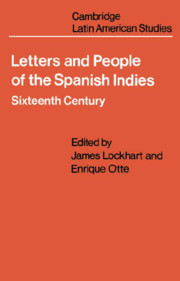Book contents
- Frontmatter
- Contents
- Preface
- Part I Conquest
- Part II The Variety of Life in the Indies
- 11 An encomendero's establishment
- 12 An encomendero's opinions
- 13 The miner
- 14 Commerce across the Atlantic
- 15 The professor of theology
- 16 The new arrival
- 17 The tanner and his wife
- 18 The troubadour
- 19 The nephew
- 20 The garden and the gate
- 21 The woman as settler
- 22 The farmer
- 23 The petty dealer
- 24 The Flemish tailors
- 25 The nobleman
- 26 The Hispanized Indian
- 27 Indian high society
- 28 An Indian town addresses the king
- Part III officials and Clerics
- Bibliography
- Index
20 - The garden and the gate
from Part II - The Variety of Life in the Indies
Published online by Cambridge University Press: 06 August 2018
- Frontmatter
- Contents
- Preface
- Part I Conquest
- Part II The Variety of Life in the Indies
- 11 An encomendero's establishment
- 12 An encomendero's opinions
- 13 The miner
- 14 Commerce across the Atlantic
- 15 The professor of theology
- 16 The new arrival
- 17 The tanner and his wife
- 18 The troubadour
- 19 The nephew
- 20 The garden and the gate
- 21 The woman as settler
- 22 The farmer
- 23 The petty dealer
- 24 The Flemish tailors
- 25 The nobleman
- 26 The Hispanized Indian
- 27 Indian high society
- 28 An Indian town addresses the king
- Part III officials and Clerics
- Bibliography
- Index
Summary
Juan Prieto, in Potosi, to his wife in Valladolid, Old Castile, 1551
… so that they will build me a double door and a stone arch into the garden …
Spaniards were by no means immune to nostalgia. No people were ever more insular, more attached to locality and lineage. The original intention of a great many of the migrants was to make money and return with it to Spain, and even those most deeply entwined in the affairs of the Indies were often tempted by the thought of returning, as several of these letters attest. Here is the letter of a man absorbed by thoughts of home. Juan Prieto is a small trader of some kind, perhaps one of those who bought Indian products in the country and sold them in Potosi, or one of the small independent merchants who brought shipments of goods from Arequipa. His business has gone quite well; at the moment there is a lull. For weeks he has been dwelling on what he will do when he gets home to Valladolid: improve relations with the important people who were once his patrons have parties with compatriots who will go home at the same time; retrieve his family from the in-laws with whom they are staying; start seeing about a good marriage for his daughter Sabina. At the center of his dreams is the vision of a sheltered garden, the garden of his own house, which is to be a green oasis, full of fruit trees, doves and rabbits, completely closed in from the outside ('there should be no aperture anywhere’). The crowning point is to be a double wooden door at the garden entry, framed in a cut stone portal, toward which Prieto is sending a good sum of money, and for which he gives lovingly detailed instructions.
Most Spaniards probably felt something like this at times. Surely no place was so conducive to nostalgia, though, as the mining towns: raw, unpleasant, and remote from the amenities of the capitals. Not one Spaniard in ten thought to stay in such a place longer than it would take him to amass a decent fortune. Meanwhile, thoughts of home were a morale builder and diversion, to which the only alternatives were the bullfights and tournaments Prieto mentions, or the gambling and fighting the mining camps were famous for.
- Type
- Chapter
- Information
- Letters and People of the Spanish IndiesSixteenth Century, pp. 131 - 135Publisher: Cambridge University PressPrint publication year: 1976



